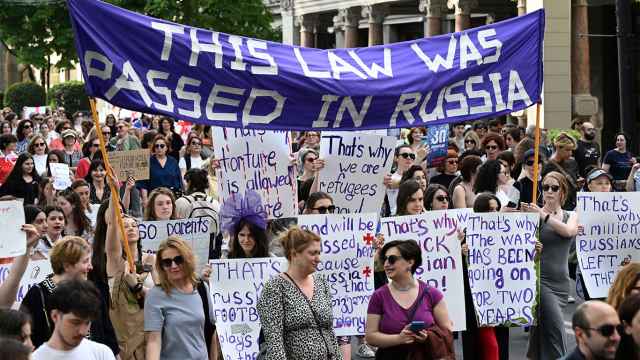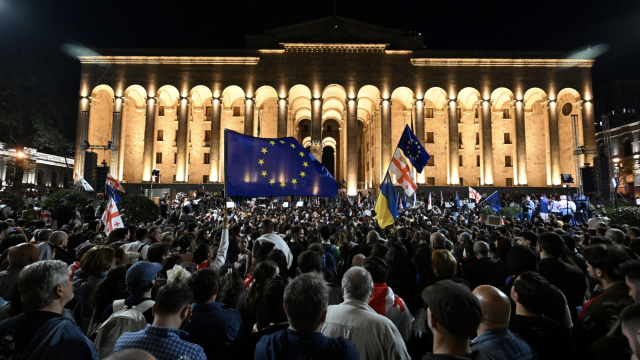The turbulent aftermath of Georgia’s recent parliamentary elections has created uncertainty over the country’s political and economic prospects as the ruling Georgian Dream party faces criticism from the opposition for what they see as electoral irregularities, anti-Western rhetoric and illiberal legislation.
The Georgian lari has lost 5% of its value since the Oct. 26 elections, which sparked months of opposition protests over alleged vote rigging and Georgian Dream’s suspension of its EU bid.
The Georgian opposition insists that the government risks plunging the country into stagnation and international isolation by alienating the West.
Georgian Dream, meanwhile, presents itself as a stabilizing force that can preserve the country's business climate and high economic growth.
Prime Minister Irakli Kobakhidze claimed that his party was not abandoning the goal of European integration despite the freezing of EU accession talks. Nevertheless, the government said it would like to avoid a serious escalation in the confrontation with Russia, which, it says, will not harm the Kremlin but could cause problems for Georgia itself.
What do we know about Georgia’s economy?
Georgia is a small country with a population of about 3.7 million and a GDP of $35.9 billion.
Although living standards in Georgia remain comparatively low, the country's GDP has grown by an average of 5% over the last 10 years.
In 2022, Georgia recorded a GDP growth of 11%, the highest since 2007. World Bank projections place Georgia’s GDP growth in 2024 at 9% and expect it to decline to a still respectable 6% in 2025.
Sixty economists surveyed by the Policy and Management Consulting Group, an international consulting firm, forecast GDP growth for the Georgian economy at 3.6% in 2025, citing risks of political turmoil and further destabilization of the lari.
Georgia’s business climate is known for its attractively low taxes and lax regulation, at least by the standards of other post-Soviet countries.
For example, individual entrepreneurs pay as little as 1% tax, while foreign company status, used by companies in the IT and maritime sectors, offers 5% corporation and employee salary tax.
The country's challenges include a lack of financing, which makes it difficult for small businesses to expand and invest, and weak productivity, as a high proportion of the population lives in rural areas, according to the World Bank.
What role does the West play in Georgia’s economy?
Georgia has tried to follow a Western path since the fall of the Soviet Union and especially after the Russian-Georgian War of 2008.
The first pillar of Georgia's economic relations with the West is direct aid and investment.
The EU has allocated 563.1 million euros in funding to Georgia for 2019-2024, with most of the money going to support government services. In addition, the EU has mobilized 2.1 billion euros in investment for infrastructure and other projects in Georgia since 2021.
For its part, the U.S. provided $1.3 billion in foreign aid to Georgia in 2015-2023.
The second pillar is the West-Georgia trade and investment relationship.
The U.S. and EU account for about half of Georgia's trade turnover, although the West exports much more to Georgia than it imports.
Western countries sell such goods as cars and pharmaceuticals to Georgia, while Georgia exports minerals and agricultural products to the West.
Moreover, the EU, the U.K. and the U.S. account for about 50% of the foreign direct investment stock in Georgia.
Finally, Georgia’s cooperation with the West brings other benefits such as remittances and foreign tourism. For example, money transfers into the country from the EU amounted to $1.4 billion in 2023.
What about Russia and Georgia’s other neighbors?
Georgia's relations with its neighbors are also significant. Russia, with which Georgia severed all official diplomatic relations in 2008, remains an important economic neighbor, though it is by no means the only one.
First, Georgia depends on its neighbors for two critical types of resources: food and energy.
For example, in 2023 Russia supplied 97% of the wheat and flour imported into Georgia, valued at $92 million.
Russia and Azerbaijan also provide most of Georgia’s imported energy. In 2024, Russia supplied Georgia with 708 million tons of oil products, about 40% of Georgia’s total oil imports.
Azerbaijan supplied Georgia with 1.63 million tons of natural gas (72.5% of all imports) worth $314 million, while Russia sent another 650,000 tons worth $180 million.
Second, Georgian goods have limited penetration of Western markets, and the country sells most of its exports to its neighbors.
For example, cars were Georgia's main export in 2023 and 2024, with Kyrgyzstan, Kazakhstan, Azerbaijan, Armenia and Russia making up the top five export destinations in 2023. In 2024, Georgia's car exports to Russia fell sharply, but a significant volume of cars destined for Kyrgyzstan are thought to be re-exported to Russia.
Russia also remains the key market for Georgian wine, with $182 million or 66% of total wine exports going to Russia.
Third, Russia has a commercial presence in Georgia which only increased after its invasion of Ukraine sparked the relocation of tens of thousands of Russians to the South Caucasus country.
For example, the Georgian energy company JSC Telasi is owned by Russia's Inter RAO, while the mining and minerals company Rich Metals Group has been linked to Russian citizens.
In 2022-2023, Russian citizens registered 26,339 businesses, 260% more than in the years 1995-2021, according to data from the study of Transparency International Georgia.
An influx of Russian tech workers fleeing the war in Ukraine contributed to a roughly 50% expansion of the IT and communications sector as a share of GDP in Georgia from 3.9% in 2021 to 6.7% in 2023, according to the International Monetary Fund.
Finally, migrant flows also contributed to the increase in remittances to Georgia from Russia, with the money inflows from Russia increasing from $411 million in 2021 to $2 billion in 2022 before again falling below the $1 billion mark in 2023.
Put together, the factors associated with Russian migration increased demand for Georgia's goods, services and currency spurred GDP growth, even though it is important to note that this effect may be temporary and is likely to diminish over time.
What happens next?
As a small, open and relatively diversified economy, Georgia seeks to maintain ties with the West without severing its economic links with Russia, which remain important to the South Caucasus country's economic health.
The current standoff between the Georgian Dream and the EU complicates this task and threatens the stability of the Georgian economy, which has found new legs in recent years.
The West has taken limited steps to sanction Georgia so far, aiming instead to showcase its discontent without harming the Georgian economy.
The most obvious way for the West to put pressure on Georgia is to cut direct aid to the country. The EU has already said it will freeze 121 million euros in funding over the conflict with Georgia Dream.
The West still has lots of room to do more damage, such as going after companies believed to be associated with Georgian Dream and its supporters.
A larger share of the economy under sanctions can lead to over-compliance, where foreign companies avoid investing in the country for fear of secondary sanctions.
If the West decides to impose industry-wide sanctions the situation will become even more complicated, although this scenario is far from being on the cards.
Put simply, the greatest danger is not the direct cutoff of Western aid to Georgia, but the toxic effect of sanctions on other companies, including those from Georgia's neighbors other than Russia or from Asia.
Sanctions jitters may cause panic in Georgia itself, leading to a withdrawal of lari deposits to exchange for dollars, dealing a blow to the banking sector and causing a devaluation of the lari, said Beso Namchavadze, an economic analyst at Transparency International Georgia.
“Currently, Georgian banks hold 28 billion lari in deposits. Imagine the fallout if depositors began withdrawing or converting this sum into dollars,” Namchavadze said.
He added that the National Bank of Georgia would have limited resources to stabilize the lari to avoid a fallout.
Among economists surveyed by the Policy and Management Consulting Group, 71% said that the Georgian government's suspension of talks with the EU would have a "very negative" impact on the country's economy.
The economists cited cuts in development aid and foreign direct investment from the West as the main risks, followed by a deterioration in the domestic business climate and instability of the national currency.
A Message from The Moscow Times:
Dear readers,
We are facing unprecedented challenges. Russia's Prosecutor General's Office has designated The Moscow Times as an "undesirable" organization, criminalizing our work and putting our staff at risk of prosecution. This follows our earlier unjust labeling as a "foreign agent."
These actions are direct attempts to silence independent journalism in Russia. The authorities claim our work "discredits the decisions of the Russian leadership." We see things differently: we strive to provide accurate, unbiased reporting on Russia.
We, the journalists of The Moscow Times, refuse to be silenced. But to continue our work, we need your help.
Your support, no matter how small, makes a world of difference. If you can, please support us monthly starting from just $2. It's quick to set up, and every contribution makes a significant impact.
By supporting The Moscow Times, you're defending open, independent journalism in the face of repression. Thank you for standing with us.
Remind me later.







